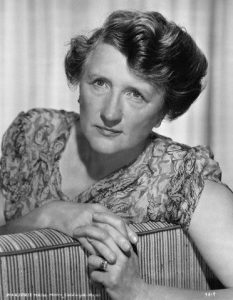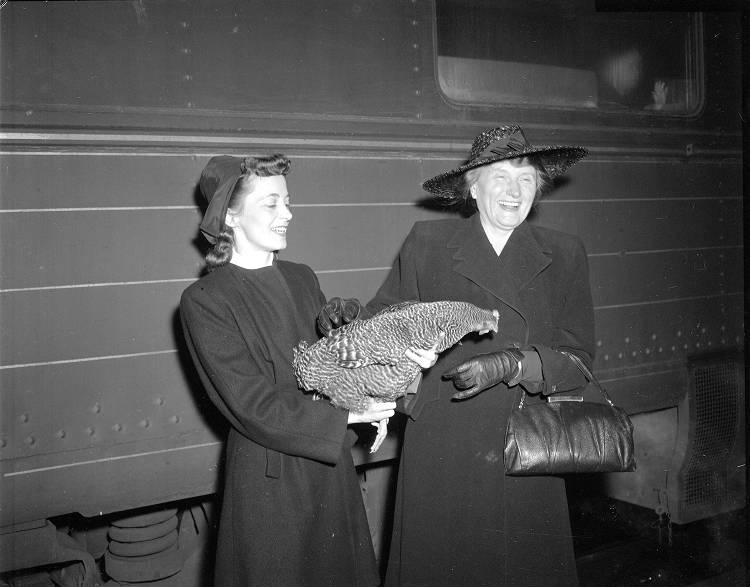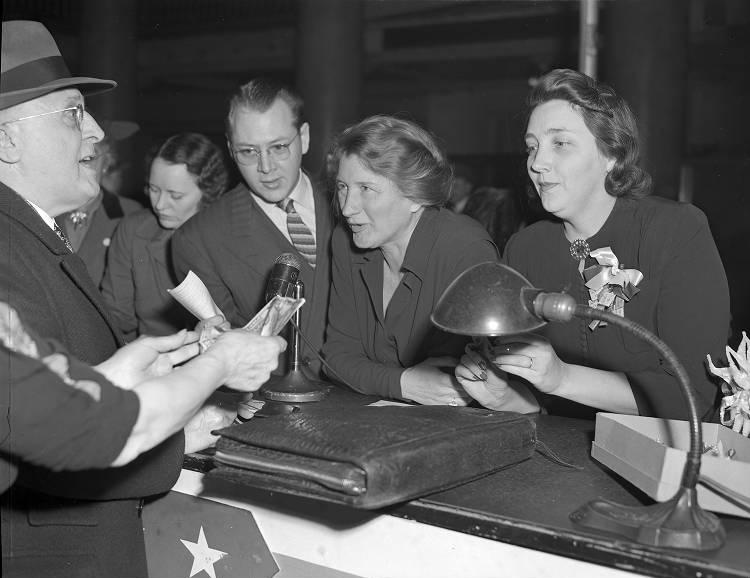
Photo info ...
Credit: Public domain via Wikimedia CommonsView Source
(Feb. 24, 1890–Apr. 10, 1975). Born near , Indiana, Marjorie Main was a film and stage actress with over 80 film credits to her name. As a prolific character actress, she often played the role of mother, housekeeper, landlady, widow, cook, maid, town gossip, or nosy neighbor. Main is most well-known and loved, however, for her role as Phoebe “Ma” Kettle in the Ma and Pa Kettle films.
Main was the daughter of Reverend Samuel Joseph Tomlinson, a Christian minister, and Jennie Tomlinson, née McGaughey. The family moved several times during her youth, living in Indianapolis, Goshen, and Elkhart, before finally settling in a rural farming community near Fairland, Indiana.
Although her father did not approve of acting, his readings from Charles Dickens along with trips to “Negro jubilee shows”—Main was taken by a family maid without her father’s knowledge—first inspired her to become an actress. She began performing skits for her family and in school, which led to her attendance at for a year before transferring to the Hamilton School of Dramatic Expression in Lexington, Kentucky, in 1906. Franklin College includes Main among its noteworthy alumni.
Main graduated in 1909 and shortly after became a dramatics instructor at Bourbon College in Paris, Kentucky. The school fired her a year later for demanding a pay increase. Main took her firing as an opportunity to continue taking classes, this time in Chicago and New York. Her first paid role, at $8 per week, was on stage as Katherina Minola, the “shrew” in Shakespeare’s The Taming of the Shrew.
In 1913, Main was hired to recite and sing Shakespeare and Dickens on the Chautauqua Circuit. She first appeared at in Indianapolis. Because her father so thoroughly disapproved of her career choice, she officially changed her name from Mary Tomlinson to Marjorie Main around this time. Through the 1910s, Main acted in productions for a stock company in Fargo, North Dakota, worked a vaudeville circuit tour, and appeared in several Broadway performances. On Broadway, she performed alongside John Barrymore in Cheating Cheaters (1916) and replaced the lead in Yes or No (ca. 1917). She also appeared several times at the Palace Theatre, New York City’s most successful vaudeville house, with W. C. Fields in The Family Ford (1920).

By the 1920s, Main met Dr. Stanley LeFevre Krebs, a lecturer and psychologist. The pair married on November 2, 1921, despite him being 26 years her senior (he was 57 and she was 31). Main took several years off from acting to manage her husband’s lecture tour across the county. She finally returned to the stage on November 4, 1927, for the opening of The Wicked Age where she played the Queen Mother alongside Mae West. A year later she also performed in Salvation (1928) alongside stage actress Pauline Lord and Burlesque (1928) with stage and film actress Barbara Stanwyck. Main was 39 years old when she finally debuted on screen as an extra in the short film Harry Fox and His Six American Beauties (1929). Her first appearance in a full-length film came two years later when she played the role of a town gossip in A House Divided (1931).
Over the next few years, she continued acting in small parts both in film and on stage. It was not until after the death of her husband in 1935 that Main played another major role. Though Main and Krebs had a less than conventional marriage, choosing to spend most of their time apart, her grief over his death inspired her role as the mother of a gangster in the stage play of Dead End, where she appeared in 460 out of 687 performances. The famed Hollywood film producer Samuel Goldwyn found Main’s performance in Dead End so compelling that he approached her to reprise her role for the movie adaptation in 1937. The film was a hit and led to several more appearances in films that year, including parts in Stella Dallas, The Man Who Cried Wolf, The Wrong Road, and The Shadow.
In 1940, Main played the role of Mehitabel Belle in the film Wyoming, the first of several films alongside Wallace Beery. In addition to having become a well-known character actress (she had made appearances in at least 39 films by this point), her success in this role and her ability to work alongside Beery helped get her first long-term contract with MGM Studios on October 8, 1940. She would go on to be paired with Beery in seven more films. She did not enjoy working with Beery, once stating about him and another actor Leo Carillo, “I should have got one salary for the actin’ and the other for the workin’ with those two, I deserved it every time I came out alive.”
Though she had lived outside of Indiana since the early 1900s, Main visited Indianapolis regularly. She returned in December 1942 to help with a war bond drive. Her work on stage and in films had gained her enough notoriety that she was able to raise thousands of dollars for the cause by including a ticket to see her on stage with every $18.75 war bond.

By the time Main completed her seven-year contract with MGM, she had appeared in a lifetime total of 61 films. Given her success, MGM signed her for another seven years. In 1947, MGM loaned Main out to Universal International Film to play Ma Kettle in The Egg and I, alongside Percy Kilbride as Pa Kettle. She initially was reluctant to take the part after the two studios refused to provide her with any extra compensation outside of her standard contract.
Main came back to Indiana in 1947 to promote the film by selling tickets to the first showing. While in Indianapolis, Main interviewed with the Indianapolis Star, saying of her character, “Ma Kettle was the grandest character role I’ve ever played. She was frowzy, but not repulsive, tough, but never vicious, big-hearted, impulsive, maternal, and her only faults were the result of circumstances over which she had no control…. Honestly, I don’t think I could have ever played that part if I hadn’t lived on a farm in Indiana.”
The Egg and I was a hit, and viewers were particularly fond of the film’s Ma and Pa Kettle characters. Main even received an Academy Award nomination for “Best Supporting Actress” for her portrayal of Ma Kettle. Because of this success, Universal decided to give Ma and Pa Kettle their own film series. The studio released Ma and Pa Kettle (also known as The Further Adventures of Ma and Pa Kettle) in 1949 marking the first of the series. The studio produced nine Ma and Pa Kettle films between 1949 and 1957, chronicling the adventures of the dysfunctional country family with its gruff matriarch, lazy husband, and brood of 15 children. The films grossed around $35 million, which helped keep Universal from bankruptcy.
Main’s second contract with MGM expired in 1954 and was not renewed. Despite this, she continued to appear in MGM films while also working for Universal on the Ma and Pa Kettle films. Friendly Persuasion (1956) was Main’s last non-Kettle film, and The Kettles on Old MacDonald’s Farm (1957) was her last feature film. Main tried television in 1958, appearing as Cassie Tanner in multiple episodes of Wagon Train, but ultimately decided it was not for her and retired at 66 years old.
Main remained in California after her retirement and lived there until her death from lung cancer.

Help improve this entry
Contribute information, offer corrections, suggest images.
You can also recommend new entries related to this topic.